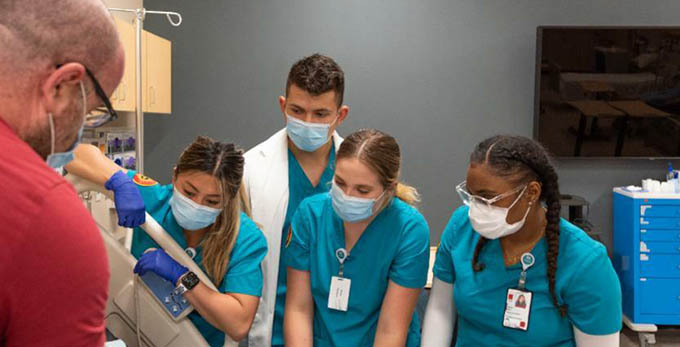The University of New Mexico College of Nursing is joining nursing schools across the country to celebrate 2022 as the Year of the Nurse Educator, an observance promoted by the National League for Nursing, the premier organization for nurse faculty and leaders in nursing education.
Nurse educators make a broad impact in health care by teaching new concepts to nurses and nursing students and building health knowledge in their communities.
“During COVID, those front-line nurses – the ones who risked their lives literally day in and day out – those are our heroes,” said assistant professor Tamara Shannon, DNP, RN, a nursing education concentration coordinator and clinician educator.
“As nurse educators, we are the ones preparing those front-line nurses to go into battle against COVID or any other challenge that they may face in their career, so it makes me very proud that I am part of the nursing specialty who grow and develop the next generation of nurses.”
After six years as a nurse in women’s health, alumna Breanne Clinger, MSN, RN, went back to school to pursue a master’s degree in Nursing Education through College of Nursing. Her goal? To make an impact in improving care for birthing people and reducing maternal mortality rates in the United States by empowering the nurses that care for them.
“I knew I needed more tools,” Clinger said. “I needed more knowledge. I needed more to be able to help in that aspect.”
Now, Clinger works for a private company that provides training and mentorship for labor and delivery nurses and other birth workers. She’s able to make a greater impact by supporting the nurses who support birthing people across the country.
UNM was able to give me the tools I was searching for – to decipher research, reach vulnerable populations, meet students where they are at and ultimately empower the nurse
“UNM was able to give me the tools I was searching for – to decipher research, reach vulnerable populations, meet students where they are at and ultimately empower the nurse,” Clinger said.
A degree in nursing education teaches a nurse to teach other nurses, building skill in creating effective educational materials and creating an educational environment that empowers learners to think critically to apply what they know.
Nurse educators also play a critical role in addressing state and nationwide nursing shortages. It’s an avenue to impact the field of nursing beyond the patient’s bedside.
“I feel that nursing education is preventive medicine,” Clinger said. “We have the power to gear nurses up with resilience and to believe in themselves.
“We know that one of the major obstacles to reversing the shortage of nurses is a lack of nurse educators and spots available for qualified applicants to nursing programs. There can be no better response to the critical shortage of nurses than to encourage more nurses to earn the requisite advanced degree to enter nursing education, and for master’s and doctoral-prepared nurses to join the ranks of National League for Nursing-certified nurse educators, the badge of expertise in this specialty area of practice,” said Beverly Malone, PhD, RN, NLN’s president and CEO.
Nursing education overlaps many areas of practice beyond the classroom. It can better equip public health nurses to present to community groups about preventive health measures. It can empower clinical nurses to serve as unit-based educators, teaching new concepts to experienced nurses, teaching new nursing graduates specific skills when they join the unit and serving as preceptors to current students.
For bedside nurses, it can improve how a nurse holds one-on-one conversations with patients about changes in their body, medical conditions and new medications.
As part of the program, students complete a clinical rotation in an educational setting most relevant to their interests: in a hospital, teaching online or in the College of Nursing. They can build skills practicing in a real educational setting, teaching real learners, with the ability to get feedback from experienced educators.
“The first time you step into a classroom, it’s not the very first time you’ve been in a classroom. You get to practice your skills while you are completing our program,” Shannon said.
The program is made for working nurses. It is delivered entirely online, and students can choose to learn on their own schedule, wherever they are. With a small cohort size, students also receive individualized attention in attaining their degree and getting tools to be successful.
